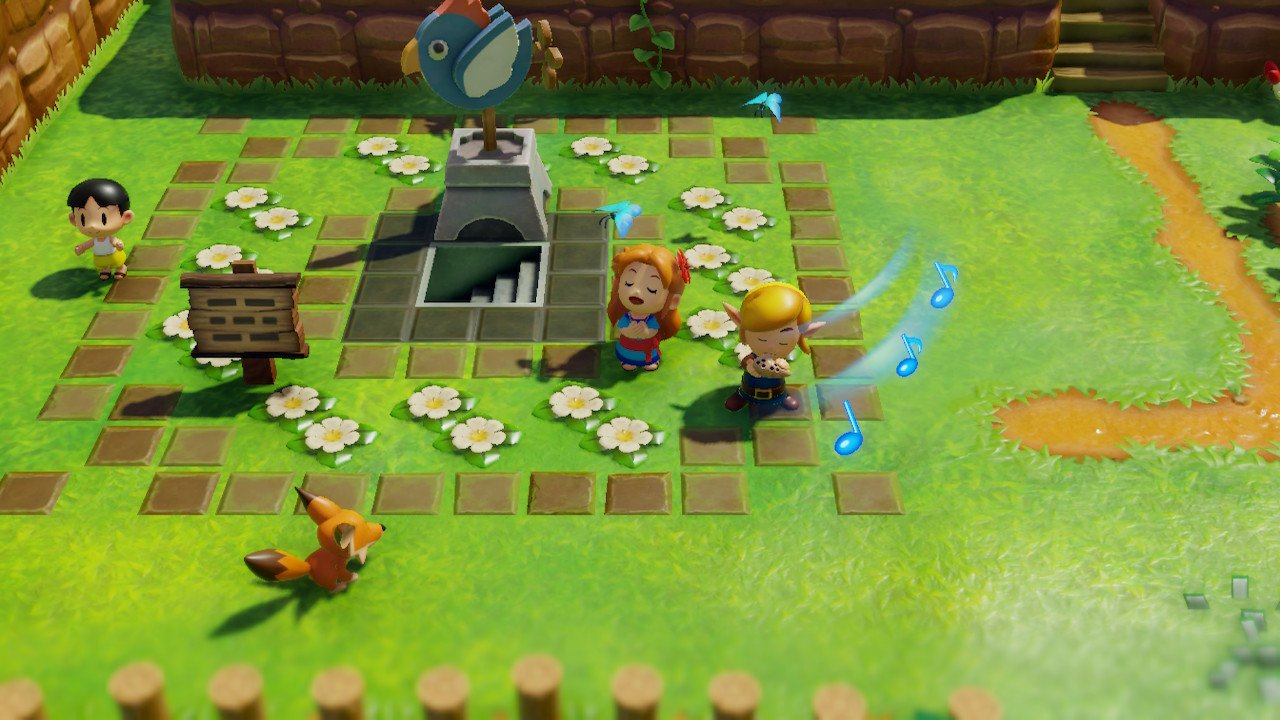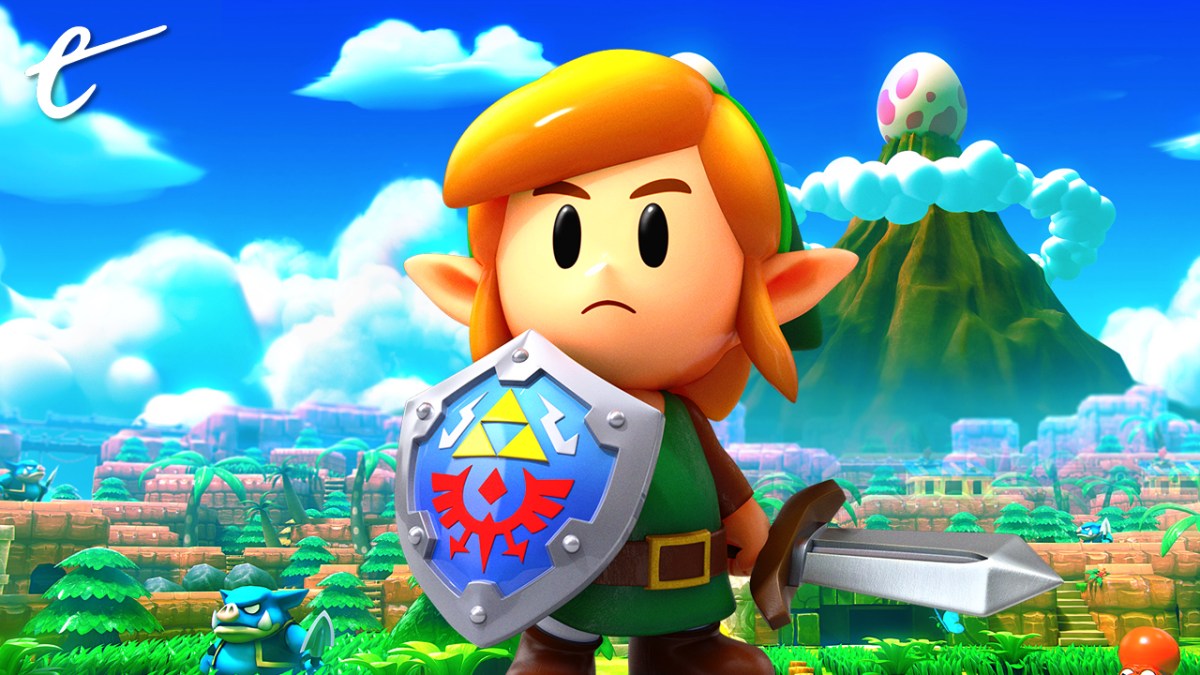The Legend of Zelda has been my favorite video game franchise for pretty much my whole life. With Tears of the Kingdom finally upon us, I decided to embark on a journey over the past year to replay as many Zelda games as I could and see if this crash course through gaming history could help me glean any new insight into a series that has meant so much to me. I’ll be relaying my thoughts through a set of short features highlighting one thing that stood out to me from each game.
Today’s game – 1993’s The Legend of Zelda: Link’s Awakening.
For me, few games are as synonymous with their hardware as The Legend of Zelda: Link’s Awakening with the original Game Boy. It delivered an adventure of comparable quality to its SNES predecessor, while simultaneously leaning into the built-in intimacy of a game existing fully in the palm of your hands. And throughout its evolutions on the Game Boy Color and remake on Nintendo Switch, it solidified the truth that you could have a top-tier Zelda game that doesn’t rely on Link saving the world.
At first glance, Link’s Awakening feels like a truncated version of A Link to the Past. Gone are the sprawling parallel worlds, replaced instead with the relatively compact Koholint Island. There’s no Princess Zelda to aid, no Triforce to gather, and no Hyrule to save from a cataclysmic evil. But this lack of breadth gives way to an emotional depth. In this game, you’re not trying to save a kingdom from the tyrannical rule of a dark overlord. In fact, all of the residents of the island seem happy. It’s the kind of place that a weary hero like Link could settle down and call home, if only for the small caveat that this reality exists solely within the dream of the slumbering Wind Fish.

If A Link to the Past’s Flute Boy parable was a punch to the gut, the ultimate reveal and ending to Link’s Awakening was an emotional body slam that I’m not sure I’ve fully recovered from, 30 years later. Between the bittersweet fate of Koholint Island and Simba’s journey throughout The Lion King, the first half of the ‘90s did a lot of heavy lifting in teaching my young mind about grief.
While the stakes in Link’s Awakening are smaller in scale, that doesn’t mean they’re any less impactful. The time you spend with the wide-eyed Marin, curious Tarin, and the other wonderful residents of Koholint Island helps weave a deep and personal bond. This world might be the manifestation of a sleeping deity, but does that make the connections you forge any less real? This question makes your time with Link filled with a bubbling inner conflict.
In your quest to gather the musical instruments necessary to wake the slumbering Wind Fish, you have to defeat each dungeon’s Nightmare boss, which act as the island’s white blood cells. They want the dream to remain and try to explain to you that your eventual success will mean the end for Koholint and all of the people you’ve met along your journey. Whenever I reach the point in the game where it’s time to finally wake the Wind Fish, I find myself hesitating. In the rest of the series, Link is clearly the hero in a very binary sense. But in this game, I’m not so sure of that. Side note, for a deeper dive into that question, I recommend checking out Razbuten’s excellent video essay on the topic.
While almost everything I’ve written above can apply to any version of the game, I need to clear a bit of space to highlight just how wonderful developer Grezzo’s 2019 remake is. The tilt-shift visuals provide a timeless look that taps into the sensation of peeking into a diorama. In this modern rise of the cozy game, it’s the coziest Link has ever been. Alongside Wind Waker, it’s as visually distinct of a Zelda game that we’ve ever gotten, and I’d love to see more of this.

I really hope the success of this remake means that Grezzo is currently working on any project that it wants to. Whether that’s another remake of a handheld Zelda, a similar take on another Nintendo property like Mother (hey, a boy can dream), or its own original game, count me in to play whatever it is day one. The team deserves to be given space to cook, and I hope Nintendo lets them.
Alongside the tone and presentation, Link’s Awakening’s gameplay is as playful as the series has been up until this point. While A Link to the Past featured karmic punishment for badgering innocent cucco, Link’s Awakening ushered in the tradition of packing Zelda games with a variety of tiny, missable, and delightful details that make the world feel alive.
Successfully stealing the overpriced bow from the shop will result in Link being rebranded as “Thief” by every character in the game. Similarly, if you do a bit of exploring during the segments when Marin is following you, there’ll be additional dialogue and bonus interactions littered throughout the island. These are the kinds of wonderful moments of interactivity that would become commonplace in nearly every Zelda installment afterwards.
Also, I’d be remiss if I didn’t shout out just how great Roc’s Feather is as an item. The ability to jump fundamentally changes the way you think about movement, puzzles, and combat in a Zelda game. So I guess at least something good came from Zelda II: The Adventure of Link.
No matter how many times I go back to revisit Link’s Awakening, I’m always taken aback by the charming intimacy on display in this compact game. In that sense, it seems fitting that Nintendo would follow up this pocket-sized adventure with one of the most massive technological leaps we’ve ever seen in our medium.
Check out other entries in this ongoing Zelda series below.
- The Legend of Zelda’s Secret Weapon Is Trust
- Zelda II: The Adventure of Link Is a Bold and Important Failure
- In A Link to the Past, One Moment Made Zelda Feel Truly Magical
- Ocarina of Time’s Forest Temple Is Zelda Dungeon Perfection
- Majora’s Mask Isn’t Just a Video Game
- Wind Waker’s Greatness Proves That Epona Kinda Sucks
- The Best Dungeon in Twilight Princess Finds Love in a Hopeless Game






Published: Apr 28, 2023 03:30 pm